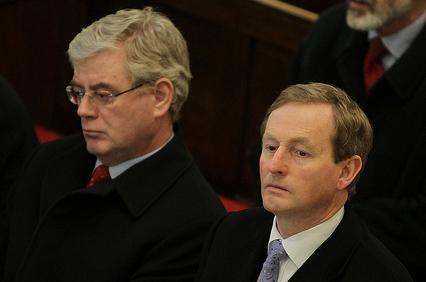Broken promises and a discredited government

Michael Noonan's announcement last week on the promissory note deal is cause for a deepening pessimism about what is happening to this society. By Vincent Browne.
So now we know for certain: the Government is not seeking a fairer sharing of the cost of fixing Ireland's broken banks and is not seeking to require senior bondholders of Anglo Irish Bank and Irish Nationwide to share the cost of recapitalising these troubled financial institutions.
The Government is satisfied merely to seek a reduction in the interest payments - or to seek a deferral of instalments on the massive bank debt inflicted on the Irish people.
According to Taoiseach Enda Kenny, the Government never sought a write-down of the debt which, essentially, is what this "fairer sharing" would have been about, even though this was explicitly promised by Fine Gael before the election just over a year ago.
Kenny might have been badly advised about this, and maybe Minister for Finance Michael Noonan did seek a write-down, but the ECB told Noonan where to get off.
One way or another, Noonan's announcement on the deal on the promissory note last Thursday was cause for a deepening pessimism about what is happening to this society.
Let's go back to last year's election campaign. The second point of Kenny's relentlessly repeated five-point plan was: 'Fair deficit reduction' on page 5 of the manifesto.
"Fine Gael believes that the IMF/EU bailout deal has not and will not restore investor confidence in our country, and must therefore be renegotiated to reduce the interest rate and to ensure a fairer sharing of the cost of fixing Ireland's broken banks," it said.
Page 16 of the manifesto - in the section dealing with banking - contains the following: "Fine Gael in government will force certain classes of bondholders to share in the cost of recapitalising troubled financial institutions. This will be done unilaterally for the most junior bondholders (owners of preference shares, subordinated debt and similar instruments), but could be extended as part of a European-wide framework for senior debt, focusing on insolvent institutions like Anglo Irish and Irish Nationwide that have no systemic importance."
If Fine Gael had stated at the time - as Noonan said last Thursday afternoon - that it was committed to reviewing arrangements to capitalise Anglo Irish Bank and Irish Nationwide, is it likely that it would have won 76 seats in the new Dáil?
Just think of what the "Frankfurt's way or Labour's way" man would have made of that in the heady days during which Eamon Gilmore thought he might become Taoiseach.
Labour promised in its manifesto (page 9): "Labour believes that bank bondholders should share in bank losses", and "Labour will seek to ensure that burden sharing with bondholders is part of a renegotiated (EU/IMF) deal."
Had Labour said at the time: 'We won't even press to ensure burden-sharing with senior bondholders and we will pay the bank debt in full, although we will try to get the interest rate reduced and to extend the period of debt repayment," just think how ridiculous, even then, the "Frankfurt's way or Labour's way" posturing would have seemed.
The reality is that this government, in neither seeking to get a write-down of the bank debt nor pressing persistently for that, has dishonoured the most important pledge made to the electorate in the last election.
In doing so, it is complicit in the monstrous injustice represented by the infliction of the bank debt on the Irish people. Those who will pay for this dishonoured pledge will include the poorest in society for generations to come.
That, of course, will represent a further dishonour, for it will be in breach of the repeated promise to protect the vulnerable.
So we have a government that is heedless of the promises it made that helped it to get elected, and we have an economy that is moving deeper into recession and a society that is moving deeper into inequality.
The revelation by the Central Statistics Office on 22 March about what happened to the economy last year was so spectacularly underplayed by the media that one assumes sales of the green jersey are the hottest item in the shops these times.
The CSO showed that, in 2011, the economy contracted by 2.5%, a disastrous performance after years of recession.
The GDP figure - which, for Ireland, is largely meaningless, because of the scale of transfer pricing and the repatriation of profits by foreign companies here - showed a slight increase of 0.7%, and it was this figure that the green-jerseyed media were fixated on.
The retail sales index data published last Wednesday, which showed a continuing fall in retail sales, in spite of the green jersey sell-outs, suggests the economy is continuing to decline.
And the Survey on Income and Living Conditions (SILC) data published last Tuesday, which also got almost no media attention, showed that the poorest 10% of earners had a 26% decrease in their household disposable income and the richest 10% had an increase of more than 8% (page 11) - maybe the most spectacular inequality leap in a single year in the state's history.
But who cares about equality, and who cares about election promises? {jathumbnailoff}
